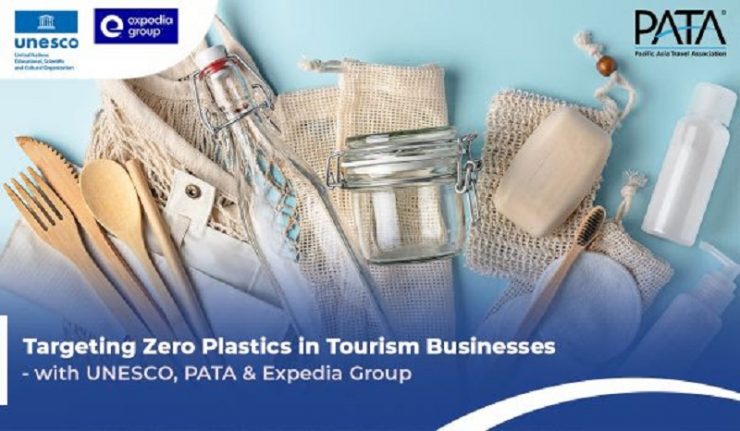THE PACIFIC Asia Travel Association (PATA) is pleased to announce the launch of a new online resource for increasing the sustainability of the tourism sector. The course, Targeting Zero Plastics in Tourism Businesses – with UNESCO, PATA & Expedia Group, is launched in conjunction with this year’s PATA Destination Marketing Forum (PDMF), held in Songkhla, Thailand, from August 2-4.
In March 2022, PATA started a collaboration with the United Nations Educational, Scientific and Cultural Organization (UNESCO) with the goal of advising tourism and hospitality businesses on plastic waste reduction. To achieve this, PATA has developed this online course to provide step-wise guidance on minimising the sourcing and consumption of single-use plastics as well as the importance for organisations to sign the UNESCO Sustainable Travel Pledge.
The Pledge, which is a collaboration between UNESCO and Expedia Group, is open and applicable to all tourism businesses, regardless of their size or location. By signing the Pledge, they will be joining a network of leading tourism and hospitality businesses that are helping their destinations in the development of sustainable tourism.
“The Sustainable Travel Pledge is particularly timely as we work to build a new kind of tourism in the wake of the COVID-19 pandemic, by inviting local tourism stakeholders to commit to inclusive and sustainable measures,” said Ernesto Ottone R., UNESCO Assistant Director-General for Culture.
Meanwhile PATA CEO Liz Ortiguera said the pandemic caused hardship in tourism destinations worldwide, but also led to severe setbacks in our fight against plastic waste. Now is the time to take action and strive for a more sustainable tourism and hospitality industry. We’re proud to make this contribution to plastic waste reduction efforts.
The amount of plastics we currently produce, consume and dispose of is unsustainable, and tourism activities and hospitality businesses do contribute largely to this issue. In the Mediterranean, for example, marine litter increases up to 40% during tourist peak season (One Planet, 2021), and this poses a threat to tourism destinations themselves.
As put by Ang Choo Pin, Managing Director Asia, Expedia Group said it is essential for hotels, restaurants, tour operators and all other tourism businesses to reduce the amount of plastics they generate and dispose of the unavoidable plastics responsibly if they wish to protect the very assets they rely on to attract customers”.
Reducing single-use plastics in tourism and hospitality businesses provides not only an opportunity to protect the destination’s ecosystems but also to support the local community and economy, as it is advocated throughout the online course.
“This is because sourcing local products and using local resources and services in tourism offerings and activities reduces reliance on international supply chains as well as economic leakages. Moreover, local artisanal products are more likely to be made of natural, renewable materials than mass-produced ones,” Ang Choo Pin remarked.
Likewise Dr. Hanh Duong Bich, Program Specialist and Chief of Culture Unit at UNESCO Office in Bangkok said the course developed by PATA is an incredible resource for businesses to understand the relationships between communities, culture and environmental protection through plastic waste reduction.
“It gives great guidance and examples on how businesses can help fight plastic waste and at the same time promote local heritage and strengthen local supply chains,” he concluded. [sources/photo special]
















